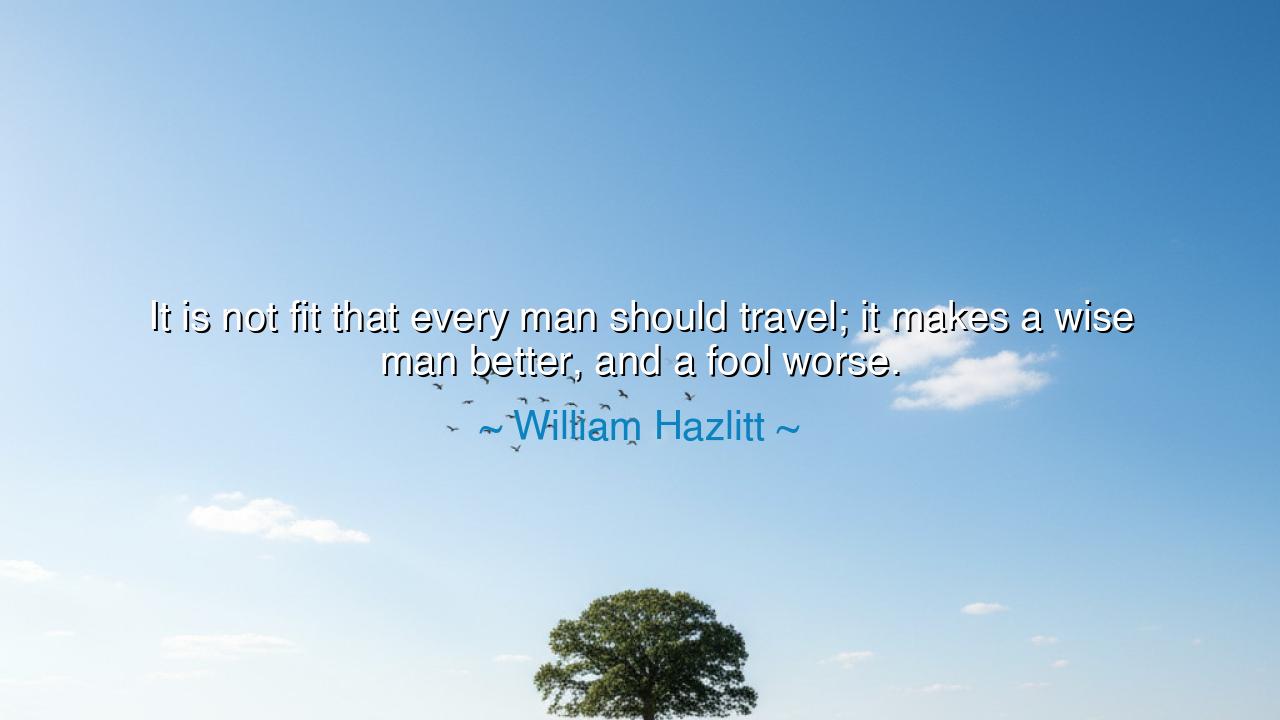
It is not fit that every man should travel; it makes a wise man
It is not fit that every man should travel; it makes a wise man better, and a fool worse.






Hear, O wayfarer of wisdom, the words of William Hazlitt, who declared: “It is not fit that every man should travel; it makes a wise man better, and a fool worse.” Though simple in form, these words cut deep, for they remind us that journeys do not change the essence of the traveler—they reveal it. To wander the earth does not guarantee growth; it magnifies what is already within. Thus Hazlitt, the keen observer of men, warns us that the road is no universal teacher, but a mirror that reflects the true nature of the soul.
The wise man, when he travels, gathers knowledge as the bee gathers nectar. He observes with humility, learns from foreign lands, and treasures the customs of other peoples. The strangeness of new worlds refines his mind and enlarges his heart, making him more patient, more discerning, more grateful. To such a man, the sea and the mountain, the market and the temple, all become teachers. His journey is not mere motion but transformation.
But the fool, when he travels, does not learn—he mocks, he complains, he flaunts his ignorance. Where the wise man sees beauty in difference, the fool sees only inconvenience. He returns home not with treasures of thought but with louder vanity, boasting of places he never understood. The ancients warned of this. Socrates said that he who is discontent at home will find no contentment abroad. For folly carried across oceans is still folly; only now it speaks with arrogance, declaring that the world is wrong and he alone is right.
History itself bears witness. Consider Herodotus, the father of history, who journeyed widely and recorded the customs of Egypt, Persia, and Scythia. His travel made him wise, for he preserved knowledge that would have perished. Contrast him with those conquerors who roamed far lands not to learn but to pillage—such men returned hardened, more cruel, their folly sharpened by distance. Alexander gained wisdom from Aristotle before his campaigns, but lesser generals who followed him sought only plunder, and their journeys made them worse than when they began.
There is in Hazlitt’s words a call to preparation. One must not think that walking foreign roads will automatically confer wisdom. The soil must be tilled before the seed can grow. A heart without humility, a mind without curiosity, cannot profit from travel. For the true journey is inward as much as outward; the mountains and seas are but symbols of the higher climb within the soul. Only the prepared traveler returns transformed.
O listener, take this teaching into your heart: do not seek distance until you have cultivated presence. Do not dream of faraway lands until you have trained your eyes to see the wonders near at hand. If you travel, travel with reverence. Observe, learn, and carry back not only stories but virtues. For the gift of travel is not the boasting of where you have been, but the quiet proof that the journey has made you more generous, more patient, more wise.
Practical wisdom follows: before you set out, prepare your spirit. Read of the lands you will visit, respect their ways, and go not as a conqueror but as a guest. When abroad, listen more than you speak, and when you return, let your words not be boastful, but fruitful—sharing insights that uplift others. Then, and only then, will Hazlitt’s warning be answered rightly: your travels will have made you better, not worse.
Thus I say to you: heed the ancient truth of Hazlitt. Travel is no charm, no guarantee of wisdom. It is a fire: it refines gold but consumes straw. Be as the wise, and you shall return from your journeys enriched in soul. Be as the fool, and you shall return poorer than when you began. The choice, O traveler, rests within your heart.






AAdministratorAdministrator
Welcome, honored guests. Please leave a comment, we will respond soon